Hello and welcome,
Yesterday we saw the passing of former Boston Mayor Thomas M. Menino. 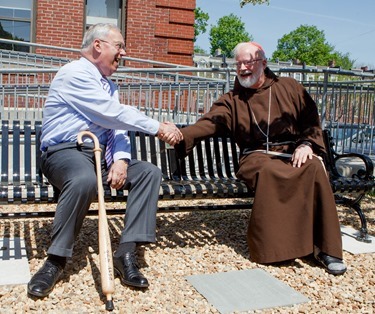
Mayor Menino placed family, faith and public service above all else. His passing is a great loss to the City of Boston, the Commonwealth, our country, and to his family, who were the center of his life.
Generations of citizens of Boston benefitted from his care and concern, first as a City Councilor and then, most notably, as Mayor for twenty years. Under Mayor Menino’s leadership, the City of Boston achieved world class status while he always remained keenly focused on the needs and concerns of the city’s neighborhoods and its people.
It is a blessing for me to have known Tom and Angela since the time I arrived in Boston and to share in their faith and their good works. They always held providing support and assistance for people in need as a priority. It was not uncommon for the Mayor to attend several church services on a given day, at our Catholic parishes and the churches and worship sites of our ecumenical and interfaith brethren with whom he had very close and supportive relationships.
We pray for Mayor Menino as we give thanks for a life so well lived, for his wife Angela, their children and grandchildren, for the people of the City of Boston and all who mourn his passing. May his soul and all the souls of the faithful departed rest in peace.
– – –
Last Thursday, we had our first meeting with our new vicars forane along with the regional bishops and episcopal vicars, to discuss their responsibilities and the very important role that the vicars have in promoting priestly fraternity and pastoral planning in the various regions of the archdiocese.
We have an excellent group of vicars forane, who are a crucial part of the archdiocesan structure. We have structured our Presbyteral Council to work in tandem with the vicariate meetings so that, in a sense, all the priests of the archdiocese are part of the conversations that take place at the Presbyteral Council, because each vicariate has representatives on the priest council that acts as a link between the council and the local vicariate.
– – –
That evening, I attended the annual Adopt-A-Student Foundation dinner to benefit Cathedral High School. I was very happy to learn that the event raised over $1.5 million.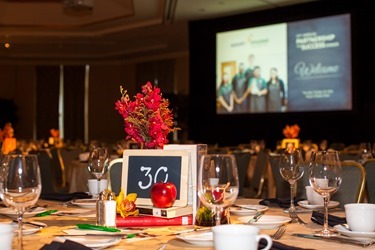
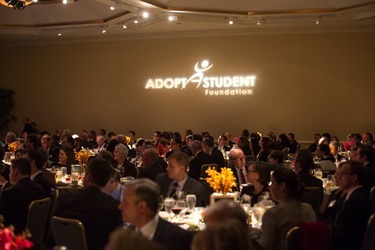
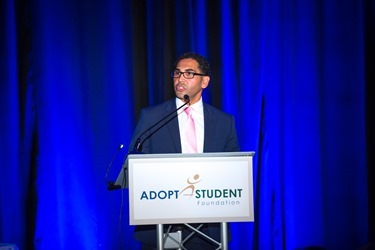
The Head of School, Dr. Oscar Santos
The alumni of Cathedral High have been crucial in supporting the school. I think it is not an exaggeration to say that the school likely would have closed were it not for the wonderful response of the alumni. John Remondi in particular has been an important figure in the whole process of setting up the board of the school and leading their annual fundraising efforts.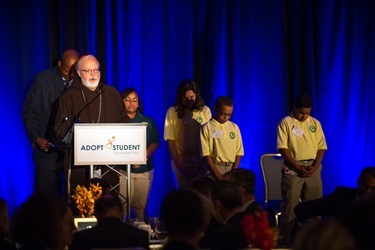
During the evening, they honored the Highland Street Foundation, which was founded 25 years ago by the late David McGrath. Today, it is headed by his wife, JoAnn and his children and continues to do so much to support important projects in our local area, including the Adopt-A-Student Foundation. 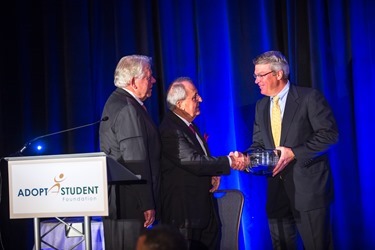
– – –
Friday, we had our annual alumni gathering at St. John’s Seminary. We were joined by a number of priests from throughout the region who had studied at St. John’s and cherished the opportunity to come back to visit the seminary and see their classmates.
We always begin the evening with Vespers, followed by a dinner in the refectory. 


It is always a very enjoyable event.





– – –
Saturday, we held our annual Archdiocesan Social Justice Convocation here at the Pastoral Center. The event is growing each year, and this year we had about 350 people in attendance.
The convocation is so important because many Catholics are unaware of the rich social gospel that the Church has. In today’s world, in which there are so many situations of injustice, it is important for Catholics to understand the vision that the Church’s social gospel presents of the dignity of the human person and our connectedness to each other.
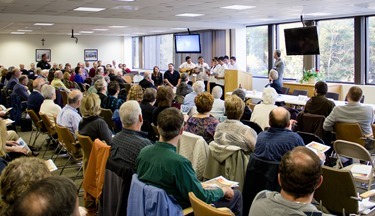
It is also important to understand the function of wealth in society, and the fact that all wealth has a social mortgage. Because of this, we have a responsibility to those who are living in poverty and in situations of injustice. Certainly Pope Francis’s preaching has stirred great enthusiasm in people’s hearts because there is a longing for a world that is more just and more in conformity with the plan of our loving Creator.
Father Bryan Hehir delivered the day’s keynote address on the social justice themes present in Pope Francis’s Apostolic Exhortation Evangelli Gaudium.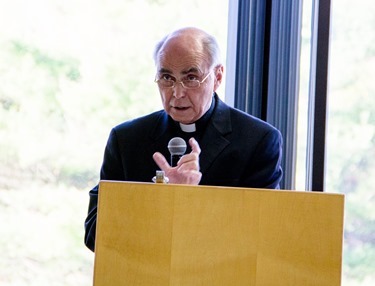
There were also two different panel discussions, one on living the social gospel of the Church on the parish level and the other on ways to help curb youth violence.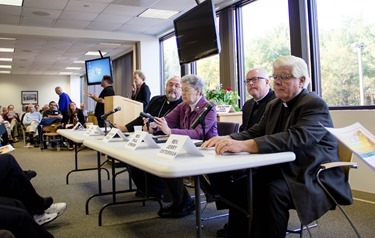
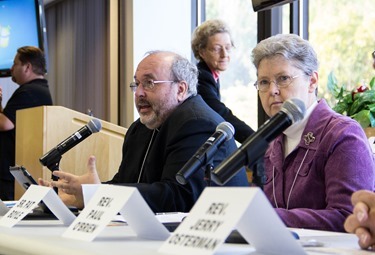
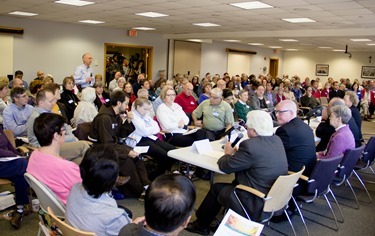
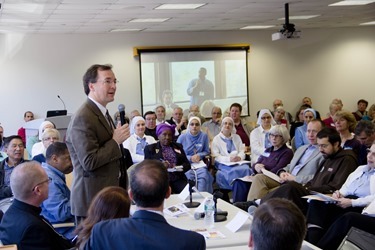 I celebrated the day’s closing Mass.
I celebrated the day’s closing Mass.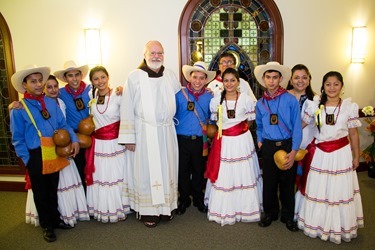
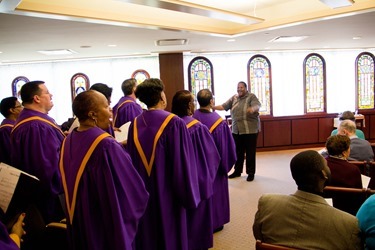
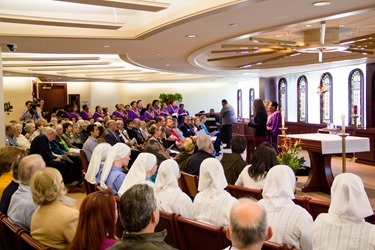
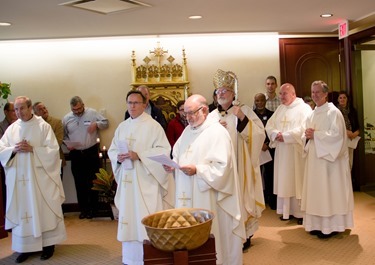
– – –
That afternoon, I was visited by Msgr. Felix Ojimba, who was living at the Cathedral when I first came to Boston. He is now back in Nigeria, but has relatives here in the states and was visiting them.
While he was in Boston he served as a hospital chaplain and also helped out for many years at St. Angela’s Parish in Mattapan.
It was wonderful to see him again.
– – –
Sunday, we had our combined celebration of the Red Mass for members of the legal profession and the White Mass for physicians. There was a very good turnout from both communities.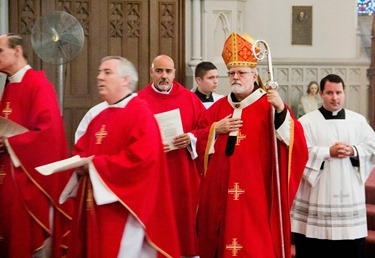
The guest of honor in the keynote speaker at luncheon following the Mass was U.S. Ambassador to the Holy See, Kenneth Hackett. 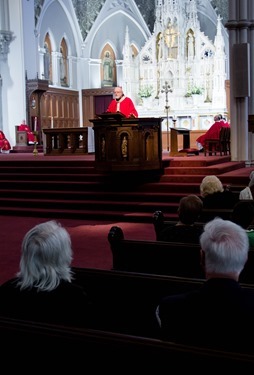
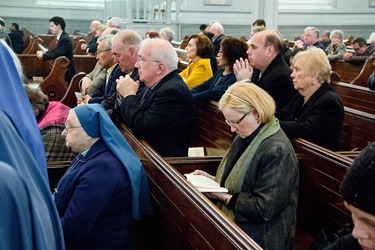
Ken Hackett had worked for Catholic Relief Services for over 30 years and been stationed in many parts of the world. He was the director of CRS for about a dozen years before being named ambassador.
It is remarkable that three of the recent U.S. Ambassadors to the Holy See have been from Boston, and all of them were present for the Mass: Ambassador Hackett, Ambassador Mary Ann Glendon and Ambassador Raymond Flynn.
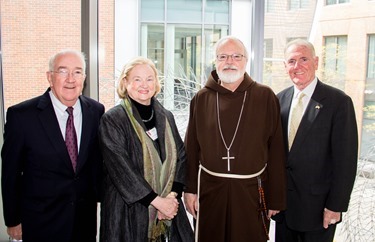
We were also very pleased that the international head of the St. Vincent de Paul society, Dr. Michael Thio, was also present for the event.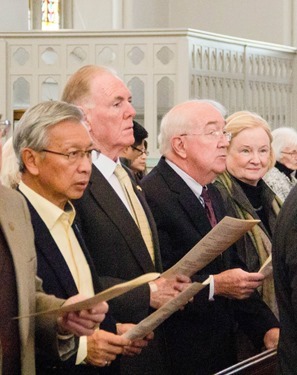
Dr. Thio with Ambassadors Flynn, Hackett and Glendon
In his keynote, Ambassador Hackett gave a wonderful explication of the role of the Ambassador to the Holy See and the history of diplomatic relations between the United States and the Vatican.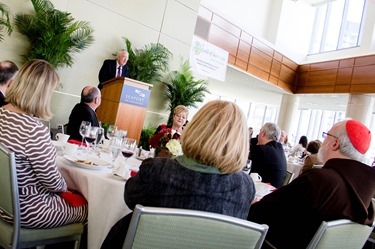
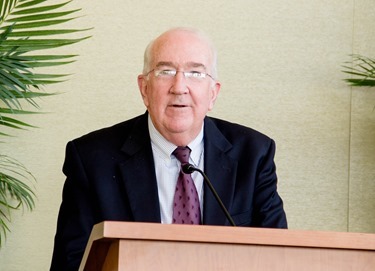
Also at the lunch, the Catholic Lawyers Guild presented the first annual Judge Joseph Nolan award to attorney Fran Hogan for her indefatigable life’s work on behalf of others and the community. 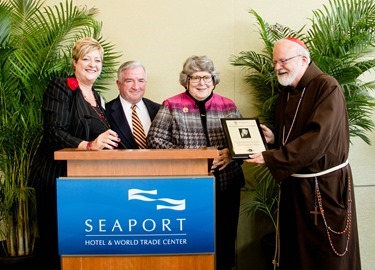
We were so pleased that a number of the members of Judge Nolan’s family were there to witness the occasion.
– – –
Monday I joined the celebration of the 50th anniversary of Georgetown’s Center for Applied Research in the Apostolate, more commonly known as CARA.
The venue for the Mass was the very historic Visitation Convent in Georgetown.


We were honored to be joined at the Mass by the Apostolic Nuncio, Archbishop Viganò; Archbishop Gerald Kicanas, who is the current president of the board; and Archbishop Gregory Aymond of New Orleans.



CARA was founded by Cardinal Richard Cushing 50 years ago and it serves as a research organization for the many different aspects of the Church’s pastoral activities. It certainly helps us to become more aware of the situation of the Church and is particularly helpful when it comes to pastoral planning or making decisions that are concerned with the apostolate, because they provide such careful studies and projections.
Because the center had been established by the Archbishop of Boston, they asked me to be there for the celebration. However, I joked with them that I had just been at the 50th anniversary of Pope St. John XXIII Seminary, recently celebrated the 50th anniversary of the St. James Society and, in a few months, I will be celebrating the 50th anniversary of the Cathedral in Galway, Ireland. I told them that I could spend my whole life going around celebrating the 50th anniversary of all the great things that Cardinal Cushing did half a century ago!
During the evening they presented an award to the Oblate School of Theology for the studies they have done on the priesthood.
– – –
Tuesday I traveled to New York for the funeral of my dear friend, Msgr. Lorenzo Albacete. 
We gathered at St. Mary’s Church on the Lower East Side of Manhattan, the church where for many years he celebrated the Spanish Mass. It is a very beautiful church and, in fact, is one of the oldest churches in the City of New York.

Concelebrating the Mass with me were Archbishop Roberto Gonzales, who was also very dear friend of Lorenzo’s; Bishop Octavio Cisneros from Brooklyn; Father José Gomez, who is now responsible for the Communion and Liberation movement in United States; and many members of the Priestly Fraternity of St. Charles Borromeo.
Of course, Lorenzo’s funeral brought together quite an eclectic crowd of friends, acquaintances and admirers. Among those present were the Supreme Knight of the Knights of Columbus, Carl Anderson, and his wife Dorian. Certainly, there were also many members of Communion and Liberation.
I want to share my homily at the funeral with you here:
Allow me first of all to tender my heartfelt condolences to
Manuel, to Mary and Olivetta, to the many friends and the C.L. (Communion and Liberation) communities.
I spoke with Cardinal Wuerl yesterday, he wanted to be here and sends regards and assurances of prayer and condolences. The Cardinal has asked Father Lee Fangmeyer and Father Frank Early to represent him and the archdiocese of Washington. Father Lorenzo was very proud to be a member of the clergy of Washington.
I also wish to express gratitude to the Parish of St. Mary’s where for many years Father Lorenzo celebrated the Spanish mass. Thank you, Father Andrew, for your gracious hospitality.
We are also pleased that Archbishop Roberto Gonzalez, such a close friend of Father Lorenzo’s, Bishop Cisneros, Father Jose Medina, and Father Chris Marino are all with us this morning. We are especially pleased that the supreme Knight Carl Anderson and his dear wife Dorian are here as well.
“Harto dificil resulta para mi…”
These were the opening words of my homily at Lorenzo’s first Mass. they became sort of a code that I would throw into a talk if Lorenzo were present. That would always get a rise out of him.
But today these words ring true: Harto dificil resulta para mi.
This is very hard for all of us who love this man.
Graham Greene, Evelyn Waugh and Garcia Marquez together did not have enough imagination and genius to invent Father Lorenzo Albacete Cintrón. Only God could create a Lorenzo and then He broke the mold because the world did not deserve to have two Lorenzo’s.
In the English world, the day after Christmas is boxing day, a day when employees and tradesmen would receive gifts. If Puerto Rico had a boxing day it would be the day after the feast of the Epiphany or” Reyes” as the Boricuas say; it would be January 7. That is the day Lorenzo arrived in this world. He has truly been a gift, a gift of the Magi to borrow the title from O’Henry’s story, but Lorenzo is the gift of the Magi, the Reyes.
He has certainly been a gift in my life for almost 5 decades. I had met Lorenzo at that time in his life when he took his famous vacation to Bogota, Colombia. A vacation Manolo arranged for Lolo (for Lorenzo). Later Lorenzo told us how he disguised himself as a priest to get near Pope Paul. When he confessed to the Pope he was not really a priest, Blessed Pope Paul said: “Why don’t you become a priest?
It was also around that time when Lorenzo first met Cardinal O’Boyle the Archbishop of Washington. Lorenzo and I spent a lot of time at St. Matthews Cathedral where I was working with Rosario Corredera and the Hispanic community. Lorenzo used to drive me very often. One day, as he was wont to do, Lorenzo parked in the Cardinal’s parking space… (Any ‘no parking’ sign was an invitation to Lorenzo.) At that moment Cardinal O’Boyle was approaching and confronted Lorenzo: “who are you,” he asked. Lorenzo replied: “I am the Cardinal”. Cardinal O’Boyle, who was something of a curmudgeon, answered back: “I am the Cardinal!” To which Lorenzo said: “yes, you are the day Cardinal; I am the night Cardinal.”
It is no wonder that after his first Mass, Lorenzo’s mother asked me to bless her new apartment. I said, “But, doña Conchita, your son was just ordained.” She said, “Yes, padre, but I think he is joking.”
Sometimes Lorenzo ruffled the feathers of the hierarchy.
Cardinal Hickey installed a special phone with an answering machine for priests so that a priest could call it any time if he had a problem. Lorenzo used to call and say things like: “your Eminence, I’ve lost my car keys, could you help me find them.” After the Cardinal was convinced that Lorenzo was not a mental case, he made him his theological advisor.
When Lorenzo was working in Boston, he brought a car phone. Only the president of the Unites States, the chief of police and the head of the mafia had a car phones in those days. When Lorenzo had a car phone installed, I chided him for his extravagance and warned him that the auxiliary Bishop was very critical of Lorenzo’s spending habits. So Lorenzo said: “really? Let’s call him up.” So Lorenzo called the Bishop from his phone in the car and said: “I’m out for a ride with Bishop Sean and I’m calling you on my new car phone. Whoops. I have to hang up, my other car phone is ringing now.” Likewise in Boston when Lorenzo was asked to preach one of the Seven Last Words for the Good Friday services at the Cathedral of the Holy Cross, Lorenzo said: “which of the seven last words Am I supposed to speak on?” When he was told that he should preach on: “my God, my God, why have you forsaken me?” Lorenzo replied: “good, I won’t have to prepare.”
And when he was installed as the Rector Magnifico of the Pontifical Catholic University of Puerto Rico, he was standing next to me on the stage. Lorenzo was wearing a baby blue academic gown with royal blue velvet panels in the ample sleeves, a colorful hood on his back, and a velvet bonnet with a golden tassel. He was carrying something that looked like a wand. Lorenzo turned to me and said: “If this gig as president doesn’t work out, I could get a job with Walter Mercado, (who is a very flamboyant Puerto Rican psychic and astrologer with a Liberaci-sque wardrobe.)
Lorenzo’s friendship with John Paul II dates to when the then Cardinal Wojtyla visited Washington. Cardinal Baum asked Lorenzo to drive the future Pope around. After he returned to Poland Cardinal Wojtyla wrote to Lorenzo with comments and ideas on the research Lorenzo was involved in at the time. A few years later John Paul II returned to Washington. When he met Lorenzo at St. Matthews he said: “Lorenzo, maybe now you will answer my letters.”
Years later Lorenzo was called to Rome to present plans for the John Paul II Institute along with a father from Opus Dei. The priest from Opus Dei was impeccably dressed in his cassock, well groomed for the occasion. He had his copious and well-developed notes in a beautiful leather binder. The priest began by saying: “your Holiness, I did not sleep at all last night knowing that today I would have to make this presentation to the Vicar of Christ on earth.” He then made a very formal and thorough presentation of his well-developed ideas. Afterwards Pope John Paul turned to Lorenzo and asked him to make his presentation. Lorenzo, with a menu of two weeks on his clerical shirt, began by saying: “your Holiness, Your Holiness, I slept very well last night.” Lorenzo then produced an envelope from Riggs Bank, from his suit coat pocket and declared: “I had an overdraft in my checking account, so the bank notified me and sent me this envelope.” He then read his brilliant notes from the back of the envelope and thoroughly entertained St. John Paul II.
We must be careful not to be so dazzled by Lorenzo’s incredible sense of humor. (Fue el hombre más occurente que había conocido en toda mi vida). There was so much more to Lorenzo. What was so out there were: his zany wit, his unkept appearance, his disorganized life, his financial problems, his phobias and his eccentricities. But as Erasmus said of Thomas More: “He was made and born for friendship.” What a capacity for unconditional love! He made everyone feel at home, you knew that you were with a friend. “En el crepusculo de la vida, seremos juzgados solo por el amor,” said San Juan de la Cruz. “At the end of our life we will be judged only by how much we loved.”
Lorenzo’s love for his family, for Conchita, for Manolo, and for friends on every continent, Catholics and atheists, Jews and Protestants was unfailing Lorenzo’s love touched everybody, whether they were from Triumph Magazine to the New Republic. He had what the Spanish call “don de gente.”
That capacity for love, compassion, empathy, made Lorenzo a great friend and a great priest, because the goodness of the Good Shepherd could be glimpsed in his goodness.
Lorenzo’s was not an easy life and his problems were a great source of worry to those of us who were close to him. There were so many false starts. Lorenzo’s meteoric career as President of the Universidad Católica in Ponce. After Lorenzo lost his job as Rector, I sent him two quotes from Fray Luis de León:
“Que descansada vida
la del que huye del mundanal ruido
y sigue la escondida senda
por donde han ido
los pocos sabios que en el mundo han sido.”
After experiencing what envy and intrigue can do to you, Lorenzo was like Fray Luis who wrote:
“Y con pobre mesa y casa
en el campo deleitoso
con solo Dios se compasa
y a solas su vida pasa
ni envidiado ni envidioso.”
Lorenzo’s tenure at Dunwoody was cut short; and his writing for the Sunday Magazine of New York Times came to naught.
But all of the pain and disappointment was dissipated because of Lorenzo’s friendship with Don Giussani. Communion and Liberation was a God send for Lorenzo. And I believe that Lorenzo was a God send for C.L. God’s loving providence engineered this wonderful match. Lorenzo loved young people and was such a gifted teacher and mentor to them. His genius was to be able to dialogue with the culture, science, and with the media. His intellect was so bright and still more illumined by his deep faith.
The love and devotion of the C.L. Community, Olivetta Danese and so many who really cared for Lorenzo and allowed him to accomplish so much, to blossom. All of the wonderful articles inTracce and other publications, the retreats and conferences would never have happened without the help and support of CL. Lorenzo dedicated his book God at the Ritz to Don Giussani from whom Lorenzo learned so much. Lorenzo defines suffering as a thirst for meaning, for understanding, for solidarity, for friendship, for affirmation. Lorenzo said: “The one who suffers wants to be assured that he or she is not crazy, guilty, an outcast for life. I have tried to show how suffering can be a point of departure towards an encounter with Mercy as the origin and destiny of life.”
Today we are consoled that Lorenzo’s suffering was that point of departure, a preface to an encounter with Mercy.
The Emmaus story documents the encounter of two disciples, overcome with grief and fear, and the Risen Christ who seeks them out like the Hound of Heaven. It is the story of a journey and an encounter, two concepts dear to Don Giussani and Lorenzo. It is the story of pain and loss, being transformed into new life and joy. The disciples are running from Calvary, they are seeking safety and they find Christ. Or Christ finds them.
They engage in a conversation. Cor ad cor loquitur. Their hearts are burning within them. Lorenzo engaged in so many of those conversations that allowed people to discover the reality of Christ. Lorenzo’s journey touched the lives of many fellow travelers and allowed them to experience Christ no longer as a stranger, but as a friend.In his own brokenness, Lorenzo could break open the word of God and release its power.
To me, one of the most fascinating lines in this Gospel is where Luke records that Jesus “gave the impression that He was going on farther.” At that moment the disciples might have said: “great talking to you. So long. See you around.” This Gospel would never have been written if they had not invited Jesus to stay with them. Christ wants to be invited. At supper, Jesus shares with them His identity and allows them to recognize Him in His self giving in the breaking of the bread. In St. Matthew’s Cathedral the De Rosen mosaic behind the altar of the Blessed Sacrament depicts the two disciples filled with Eucharistic amazement and the inscription declares: “they recognized Him in the breaking of the bread.” The Lord disappears, but the bread remains, now in the tabernacle, the Body and Blood of Christ.
They set out at once and returned to Jerusalem. They were now willing to risk their lives to share the Good News. They become participants of the mission of their Master to bring glad tidings, to liberate those captive by fear in the Cenacle, to place on those who mourn in Zion a diadem instead of ashes.
I like to think that Cleopas and his buddy were at the Cenacle with Mary and the Apostles for the outpouring of the Spirit on the Church. And I see them in today’s second reading from Acts, part of that community, devoted to the teaching of the Apostles, holding all their material goods in common, caring for the needs of all, and most importantly gathering in their homes for the breaking of the bread. Discipleship really is about liberation and communion. And the joy of knowing that the Lord added to their numbers those who were being saved.
Lorenzo’s journey was an Emmaus journey where Christ the stranger becomes Christ the friend and liberator.Lorenzo was an eloquent messenger of the joy of the Gospel. He found his strength in the Eucharist, he recognized Jesus in the breaking of the Bread.
Let me conclude with the prayer of an old priest, painfully aware of his own limitations and brokenness who reflects that when he lifts the host, he is overwhelmed by his own unworthiness, and he pleads with God that just as the priest held God in his unworthy hands, that God will never let him slip from God’s divine hands.
PLEGARIA DE UN SACERDOTE
(Lope de Vega)
Cuando en mis manos, Rey eterno, os miro
y la cándida víctima levanto,
de mi atrevida indignidad me espanto
y la piedad de vuestro pecho admiro.
Tal vez el alma con temor retiro,
tal vez la doy al amoroso llanto,
que, arrepentido de ofenderos tanto,
con ansias temo y con dolor suspiro.
Volved los ojos a mirarme humanos,
que por las sendas de mi error siniestras
me despeñaron pensamientos vanos;
no sean tantas las desdichas nuestras
que a quien os tuvo en sus indignas manos
vos le dejeis de las divinas vuestras.
Heavenly Father,
In thy hands we commend our brother, Lorenzo.
Hold on tight.

One of the more typical “Lorenzo” touches to the Mass was that there were mariachis who played “Mi Viejo San Juan” as they carried the casket to the hearse.

The parishioners, many of whom are Puerto Rican, joined in the singing of that song, which is almost the second national anthem of Puerto Rico.
– – –
Wednesday, I had the opportunity to meet the new Episcopal Bishop of Massachusetts Alan Gates, who was just consecrated bishop in September. I was unable to attend his consecration because I was in Rome, so we were happy to invite him to have lunch with me and Bishop Arthur Kennedy at the Cathedral.
Of course Bishop Gates succeeds Bishop Thomas Shaw who passed away in recent days and we express our condolences to the entire Episcopalian community.
– – –
That evening, I delivered the invocation at the annual dinner to benefit St. Francis House, which was founded 30 years ago by friars from St. Anthony Shrine in Boston.
Though it is now headed by an independent board of directors, it still maintains many ties to the Archdiocese of Boston and the Friars. They provide wonderful services to homeless people and so I was very happy to be a part of their 30th anniversary celebration. During the evening they honored Jay Hooley, the president and CEO of State Street Corporation, for his remarkable support of St. Francis house.
– – –
Yesterday, I was visited by the Mother General the Daughters of St. Paul, Sister Anna Maria. She was accompanied by the provincial, Sister Leonora Wilson, and our Delegate for Religious, Sister Marian Batho.
Sister Anna Maria is visiting all the Daughters’ houses in the United States and came for a visit during her stop in Boston. We had a very lovely talk.
They mentioned that they are preparing for the 100th anniversary of their foundation and that they will have a special gathering of the entire Pauline family with the Holy Father as part of that celebration. Also, I will be celebrating a Mass for them in June to mark the centennial of the Daughters of St. Paul and the other Pauline communities of which here in Boston we also have the Pious Disciples of the Divine Master, who were also founded by Blessed James Alberione.
– – –
Finally, with Election Day coming up next Tuesday, I want to take this opportunity to reiterate the positions that I and the other diocesan bishops of Massachusetts have taken on state ballot questions that will be decided by voters next week.
We urge a Yes vote on Question 3, which would roll back the establishment of casino gambling in our Commonwealth. The law that we have now was crafted and enacted in a time of extreme economic hardship, a time in which the state was, understandably, looking for new ways of creating jobs and revenue. However, expanded gambling is an uncertain source of revenue — many casinos in our region are shrinking or closing — and its revenue comes disproportionately from those working people and families who can least afford to gamble. Thankfully, we are experiencing an economic recovery that is stronger here than in most parts of the country and we can see that revenues and employment can continue to grow without all the social ills that high stakes gambling brings with it. This ballot question presents us an opportunity to look back at the decision to bring casino gambling to our state and correct it.
We have also stated our support for a yes vote on Question 4 that would require all Massachusetts employers to offer earned sick time to their employees. The social gospel of the Church urges us to look with compassion on those who are struggling to make a living with low pay jobs. These are the people who, many times, need to choose between going to work sick or losing the meager hourly wage that provides for them and their loved ones. A yes on Question 4 would allow workers in Massachusetts to earn up to 40 hours a year of sick time to take care of their own health or to care for a family member. It is only fair.
Until next week,
Cardinal Seán

